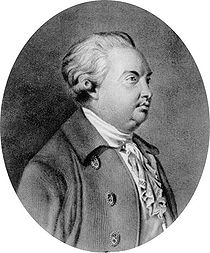
Denis Fonvizin
Encyclopedia

Russian Enlightenment
The Russian Age of Enlightenment was a period in the eighteenth century in which the government began to actively encourage the proliferation of arts and sciences. This time gave birth to the first Russian university, library, theatre, public museum, and relatively independent press...
, whose plays are still staged today. His main works are two satirical comedies which mock contemporary Russian gentry
Russian nobility
The Russian nobility arose in the 14th century and essentially governed Russia until the October Revolution of 1917.The Russian word for nobility, Dvoryanstvo , derives from the Russian word dvor , meaning the Court of a prince or duke and later, of the tsar. A nobleman is called dvoryanin...
.
Life
Born in MoscowMoscow
Moscow is the capital, the most populous city, and the most populous federal subject of Russia. The city is a major political, economic, cultural, scientific, religious, financial, educational, and transportation centre of Russia and the continent...
, of a family of gentry of Livonia
Livonia
Livonia is a historic region along the eastern shores of the Baltic Sea. It was once the land of the Finnic Livonians inhabiting the principal ancient Livonian County Metsepole with its center at Turaida...
n descent, he received a good education at the University of Moscow and very early began writing and translating. He entered the civil service, becoming secretary to Count Nikita Panin, one of the great noblemen of Catherine the Great's reign. Because of Panin's protection, Fonvizin was able to write critical plays without fear of being arrested, and, in the late 1760s, he brought out the first of his two famous comedies, The Brigadier-General.
A man of means, he was always a dilettante rather than a professional author, though he became prominent in literary and intellectual circles. In 1777-78 he traveled abroad, the principal aim of his journey being the medical faculty of Montpellier
Montpellier
-Neighbourhoods:Since 2001, Montpellier has been divided into seven official neighbourhoods, themselves divided into sub-neighbourhoods. Each of them possesses a neighbourhood council....
. He described his voyage in his Letters from France — one of the most elegant specimens of the prose of the period, and the most striking document of that anti-French nationalism which in the Russian elite of the time of Catherine went hand in hand with a complete dependence on French literary taste.
In 1782 appeared Fonvizin's second and best comedy The Minor, which definitely classed him as the foremost of Russian playwrights. His last years were passed in constant suffering and traveling abroad for his health. He died in Saint Petersburg
Saint Petersburg
Saint Petersburg is a city and a federal subject of Russia located on the Neva River at the head of the Gulf of Finland on the Baltic Sea...
in 1792.
Works and influence
Fonvizin's reputation rests almost entirely on his two comedies, which are beyond doubt the most popular Russian plays before Aleksander Griboyedov's Woe from WitWoe from Wit
Woe from Wit is Alexander Griboyedov's comedy in verse, satirizing the society of post-Napoleonic Moscow, or, as a high official in the play styled it, "a pasquinade on Moscow."The play, written in 1823 in the countryside and in Tiflis, was not passed by the censorship for the stage, and...
. They are both in prose and adhere to the canons of classical comedy
Comedy
Comedy , as a popular meaning, is any humorous discourse or work generally intended to amuse by creating laughter, especially in television, film, and stand-up comedy. This must be carefully distinguished from its academic definition, namely the comic theatre, whose Western origins are found in...
. Fonvizin's principal model, however, was not Molière
Molière
Jean-Baptiste Poquelin, known by his stage name Molière, was a French playwright and actor who is considered to be one of the greatest masters of comedy in Western literature...
, but the great Danish playwright Ludvig Holberg
Ludvig Holberg
Ludvig Holberg, Baron of Holberg was a writer, essayist, philosopher, historian and playwright born in Bergen, Norway, during the time of the Dano-Norwegian double monarchy, who spent most of his adult life in Denmark. He was influenced by Humanism, the Enlightenment and the Baroque...
, whom he read in German, and some of whose plays he had translated.
Both comedies are plays of social satire with definite axes to grind. The Brigadier-General is a satire against the fashionable French semi-education of the petits-maîtres. It is full of excellent fun, and though less serious than The Minor, it is better constructed. But The Minor, though imperfect in dramatic construction, is a more remarkable work and justly considered Fonvizin's masterpiece.
The point of the satire in The Minor is directed against the brutish and selfish crudeness and barbarity of the uneducated country gentry. The central character, Mitrofanushka, is the accomplished type of vulgar and brutal selfishness, unredeemed by a single human feature — even his fondly doting mother gets nothing from him for her pains. The dialogue of these vicious characters (in contrast to the stilted language of the lovers and their virtuous uncles) is true to life and finely individualized; and they are all masterpieces of characterization — a worthy introduction to the great portrait gallery of Russian fiction.
As a measure of its popularity, several expressions from The Minor have been turned into proverbs, and many authors (amongst whom Alexander Pushkin) regularly cite from this play, or at least hint to it by mentioning the characters' names .

